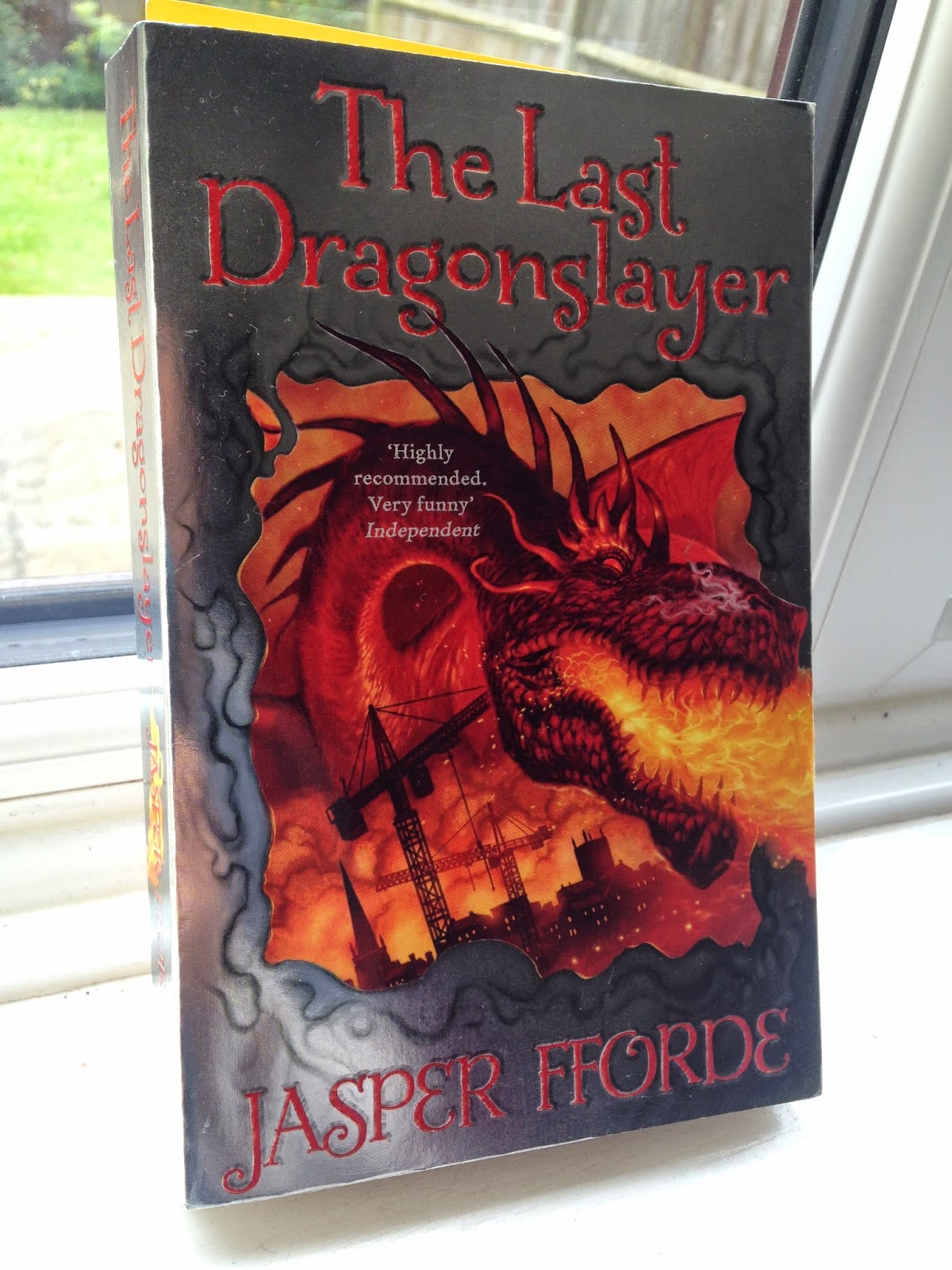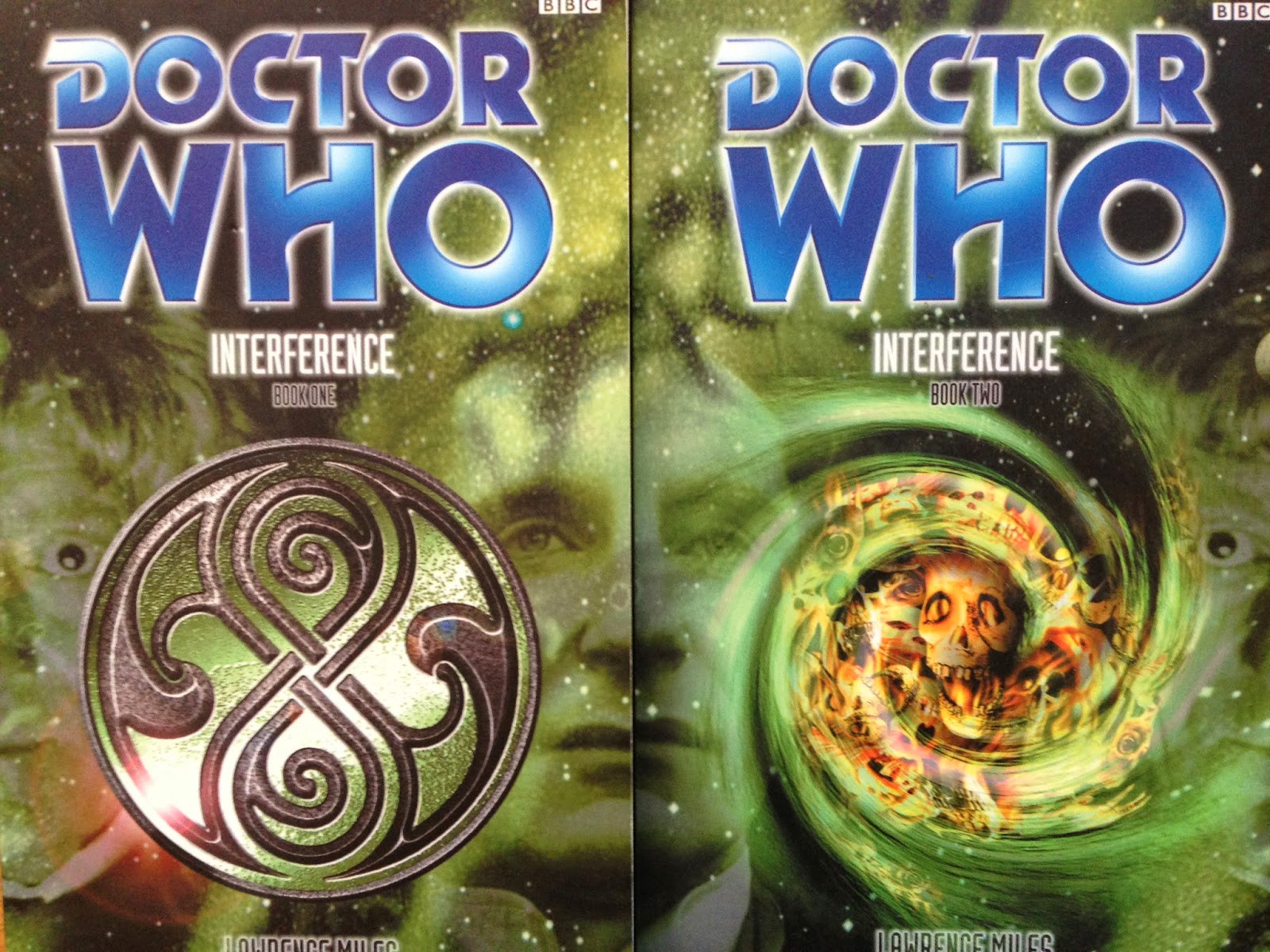Quick note to my scant number of readers. (Ah, lost, are you? The loo's over there...) Having finally sorted out my laptop's DVD player, I'll shortly be returning to some DVD reviews. By which I mean, largely, Doctor Who reviews. Just thought I should mention it.
Right then! Have at you, bookcase!
The Last Dragonslayer
By Jasper Fforde
Knowing very little about Jasper Fforde, my first reaction
to The Last Dragonslayer (other than “Thanks for the birthday present, Robert”)
was being slightly underwhelmed. A novel
about dragons, magic and wizards? All of
that’s been done. Well, I needn’t have
worried. The Last Dragonslayer takes
admittedly very familiar elements and puts them to work in a sharp, charming
plot. Against the odds, it actually
feels very original.
It’s set in a parallel world, roughly contemporary, but with
magic and dragons as a part of daily life.
I enjoyed the lived-in, clapped-out-ness of magic and the way people
deal with it: they use magic to do their plumbing, and have to fill out endless
forms to make sure it’s all accounted for, because magic is limited. I’m sometimes put off by parallel world
stories, as I feel at a conscious distance from the worlds they create, but this
one very quickly, very skilfully set out its world and made it feel
familiar. I was reminded of Harry
Potter, specifically the way those books never really reconciled how magical
and non-magical people could co-exist. I
think this one does it better.
It’s the story of Jennifer Strange, a nearly-sixteen-year-old
orphan who finds herself running a magical odd-jobs company and looking after
its assortment of wizards and witches, all of whom have varying talents and
sensitive egos. Jennifer is a wonderful
creation, believably young yet wearisomely mature.
The plot revolves around a prophecy.
(I know, they’re overdone as well, but this one is well handled and
isn’t dragged out for half a dozen books.)
The prophecy concerns the last dragon known to exist and Jennifer’s part
in its death. And really, I don’t want
to go into it too much – the plot is very tidy and it keeps moving and you should
discover it all for yourself. The book’s
short; I don’t want to spoil it.
Fforde’s book is funny without hitting you over the head
about it, thoughtful without feeling like a soapbox, and has an endearingly
fresh perspective on its fantasy tropes.
I enjoyed it, am glad there are more books in the series, and
encourage you to investigate. Race you!
The Green Mile
By Stephen King
Another Stephen King book bites the dust. Written as a serial in 1996, The Green Mile is the memoir of Paul Edgecomb – once the head guard at Cold Mountain Penitentiary, E Wing, home of the electric chair. (And a grim, lime-coloured floor.) It concerns John Coffey, a mysterious black man convicted of murdering two young girls, and it’s as grim as a Death Row story ought to be, but with some magic and humour mixed in as well.
Being six volumes rather than one, the book has an episodic
and repetitive nature, sprinkling recaps throughout just in case you’re joining
mid-way. (In an omnibus, however, this is no
longer a problem.) On the plus side, the
repetition (unintentionally?) chimes with the advanced age of the
narrator. King’s usual habit of casually
dipping into the future also genuinely seems like something you’d find in a
memoir. However, the framing device –
Paul writing his recollections in a rest home, as he avoids a transparently
evil orderly – doesn’t add much to the story.
I was generally keen to get back to the events of 1932.
As for the main cut-and-thrust of the book, it’s compelling and
has plenty of momentum. The chapters are
short; you can almost feel Stephen King hammering them out to meet his deadlines. He mentions in the Foreword and Afterword
that he enjoyed the challenge, and the change of pace. It felt like a quick read.
If there’s a major criticism, it’s a lack of depth. I saw the (excellent) Frank Darabont movie
before reading this, and there’s really not a great deal more to be found on
the page, besides a more downbeat conclusion.
The characters are all suitably good or evil, and while some are a bit
of both, a few border on archetypal.
John Coffey, besides his obvious and deliberate Jesus Christ initials, seems
like a textbook example of Spike Lee’s patented “magic negro” character. Paul’s rest home nemesis, meanwhile, comes
from a noticeably dry well marked “evil orderlies”.
It’s an equally sweet and grisly yarn, but it didn’t
leave much of an impression. The green
mile (between the cells and the electric chair) might be long, but the shadow
of King’s earlier work, Rita Hayworth And Shawshank Redemption, seems a
little longer.
Doctor Who
The Vampire’s Holiday
By Willis Hall
Willis Hall wrote a lot of children’s books about Henry
Hollins, a boy seemingly forever on holiday with his parents. They’ve encountered all sorts of oddities,
including a dinosaur and an inflatable shop, but there’s a series within the
series about Count Alucard – Dracula’s harmless, vegetarian descendant. (Not to be confused with Count Duckula, who
springs suddenly to mind.)
The Vampire’s Holiday is
the second book in the series, and it’s a lot like the first. Alucard must contend with the prejudices and
fears of a small town, before ultimately fleeing. Henry rallies to help him – he’s the only
person with the common sense to give him a chance – while the townspeople, in
particular the mayor, use the vampire business to their own ends. One of the things I loved about The Last
Vampire (and Hall’s other books) is the way every character has a point of
view, even the animals. They all have
their own individual (and usually light-hearted) dramas going on, and that makes
the story a lot more colourful.
Unfortunately there’s very little plot. Alucard winds up in England (after
his coffin is thrown overboard, although he seemed to be heading in that
direction anyway), and he never says exactly why he went there. I’m assuming it’s a holiday, re the title,
but Henry asks him why at one point and he never gets around to answering. He spends the rest of the book trying to get
away, while the people of Scarcombe variously panic, overreact and take
advantage of the situation. (Well,
wasn’t it obvious that was going to happen?)
In the middle of all this is Alucard, who’s terribly nice but scarcely
interacts with anyone, and Henry, who despite being the hero of Hall’s books
has no particular personality. I can
only assume younger readers were encouraged to project themselves onto him, because he’s the least interesting character in every scene, including the ones with
his parents.
Still, it’s a funny, friendly story, with a lovely attitude to
pre-judging others; there’s some great stuff from the point of view of some
captive wolves. The locals are all
suitably amusing, if rather familiar; Hall can’t resist working in a bit of
political satire with the mayor. It’s a
nice read, but after two books it’s a shame Henry didn’t try to change a few
minds, rather than simply helping Alucard to run away until his next
instalment. Also, the story ignores the
end of the last book, where Alucard had some intention of living with
Henry. His only friend in the world,
you’d think that would remain his Plan A.
Doctor Who
Interference
Book One: Shock Tactic
By Lawrence
Miles
This is pretty ambitious for a Doctor Who novel. It’s spread over two books, features two Doctors (Paul McGann and Jon Pertwee), and wraps up the complicated story of Sam Jones, a companion invented just for the BBC books range. I’ve only read Book One so far. How’s it going?
This is pretty ambitious for a Doctor Who novel. It’s spread over two books, features two Doctors (Paul McGann and Jon Pertwee), and wraps up the complicated story of Sam Jones, a companion invented just for the BBC books range. I’ve only read Book One so far. How’s it going?
Put it this way: if I didn’t already own Book Two, I
wouldn’t be buying it. Heck, if that
were the case, I wouldn’t have finished reading Book One.
So far (and since this is a full-priced book, it’s fair to
pause and reflect), Interference is a mess, decorated with smug window-dressing. This bit’s in italics! This bit’s in script! The chapter titles have funny
sub-headings! Ho, ho. The prose is often thoughtful, but it’s an
absolute headache keeping up with the various plot strands – and being only Book
One of Two, surprise! None of them go
anywhere.
Let’s see: there’s an international arms conference in London , where aliens are
selling black goo called “Cold” which can teleport and/or harm you depending on
the plot. (NB: This isn't the "real" Cold.) The aliens are “the Remote”,
which means they make decisions based on television signals. (I don’t know if I’ve understood that
correctly.) Sam investigates this,
while the Doctor’s other companion, Fitz, is lost in time somewhere. He’s trying to get to know the Faction
Paradox, a group of evil Time Lord somethings who are behind everything, ever.
One of the Doctor’s previous companions is here to help:
it’s Sarah Jane Smith! (And K9! Yay!) Alas,
the Doctor is in a Saudi Arabian prison being tortured, talking to himself
across time and writing maths equations in blood. Meanwhile, Sam is spirited away to the Remote
home-world (I think?), and Sarah meets a helpful Ogron – those muscle-for-hire aliens
from the Classic series. This is the
best bit, by light years. Then cut randomly to
the Third Doctor (and a younger, far less interesting Sarah Jane) trapped in
humanity’s final resting place: a Wild West parody called Dust, where
there’s a freak-show possibly involving Time Lords. Meanwhile, the Doctor – the main one, Paul
McGann – recounts this entire story later to someone, somewhere, for some
reason. Eventually things grind to a
halt because that’s all the pages you’re getting, buster.
As the first part of a story, this is just awful. The characters are mysterious to the point
where they’re barely even there. The
plot is overly busy, but it doesn’t coalesce into an actual story at any
point. I don’t know what “Cold” has to
do with anything, or why “the Remote” are worth so much exposition, or what the
blithery feck is so interesting about Faction Paradox – no, please, devote
another dozen paragraphs to how their cult operates, it’s all gold. I don’t know where Fitz is, and I don’t know
what’s going on with Sam. (If you
haven’t read all the Eighth Doctor books up to this point, worse luck. And welcome to my world.) After 309 pages, I don’t care, Book Two or no
Book Two, your story should have come together already. We should know what’s at stake. By the end of Book One, however, Interference is still
total spaghetti.
I loved Miles’s earlier book, Alien Bodies. A gem of a
Doctor Who story, it had bags of imagination and wit. There’s little in here I even recognise as
Doctor Who. An arms conference? A Saudi Arabian prison cell? Even the Doctor, both of him heavily featured
on the front and back covers, barely registers. It’s 309 pages of punishingly dull
non-story. After that, Part Two had better
be the best book ever written. No
pressure.





Hahaha, it's funny when you hate things. Although your kinder, more thoughtful reviews of the three books before the last one are good too.
ReplyDelete